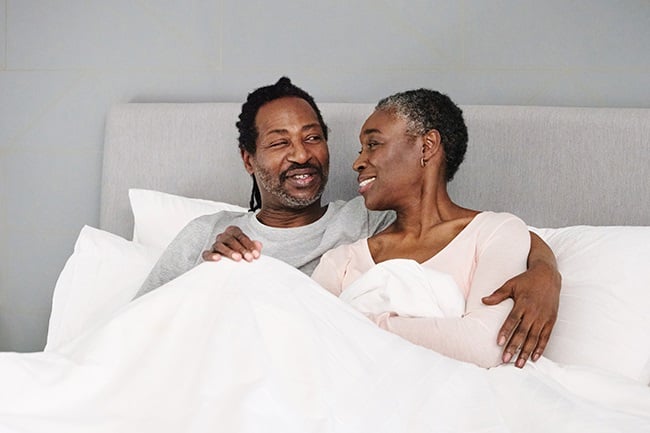
- Declining oestrogen levels results in vaginal dryness and decreased libido.
- A tip is to allow yourself to feel the arousal when dealing with decreased desire for sex.
- Hormone therapy can help manage symptoms of menopause.
It’s a never-ending rollercoaster of hormones that women have to go through from the very first flow of the red river.
After hitting puberty in your adolescence marked by the beginning of the decades-long menstruation cycle, hormone levels start to decline in 40s and 50s and the next stage of life resumes: menopause.
Symptoms like hot flashes, night sweats or decreased libido make an uncomfortable experience. And for many women, menopause comes with a flurry of misconceptions about what this new chapter of their lives will mean for their sexual health and pleasure.
READ MORE | Is second puberty a real thing? The experts weigh in
The good thing is that there’s a menopause revolution stirring in Africa, so to speak. businesses are becoming more supportive in the stresses and symptoms that come with menopause – take Sue Mbaya’s campaign Menopause Solutions Africa leading the conversation on menopause in South Africa or Business Engage Association’s awareness initiative MenoMove.
While it’s important to think about managing menopause in your daily life, let’s not forget the impact it may have on afterhours activities.
How does menopause affect your interest in sex?
Postmenopausal sex can be great, but don’t expect it to be the type of sex you were having in your 20s.
Dr Sheana Jones, obstetrician and gynaecologist at Life Vincent Pallotti Hospital in Cape Town, explains to us how menopause affects your libido.
“There is a natural decline in libido with age and this is ‘amplified’ in menopause as oestrogen levels decline. Most women will already have lower libido than a male partner. The vagina can become dry when oestrogen levels fall, and this can increase the likelihood of bacterial vaginosis which causes burning and an odour. Thrush can also become more prevalent.”
But don’t let this scare you. Dr Sheana shares some advice on how you can lead a fulfilling and healthy sex life after menopause.
“The label ‘libido’ actually includes desire and arousal. It is usually the desire which is lacking, and the arousal kicks in as things get going. I encourage women to sometimes ‘push’ themselves just a little and then the reward of the arousal will make it seem less of an effort the next time because we as humans work on a reward system.”
READ MORE | Sex after 40 - here's what you need to know
The symptoms of menopause and how it affects your sex life
Menopause brings a number of changes for women, many of which are welcomed – goodbye, periods, premenstrual stress, and pregnancy scares! Others are less so, such as hot flushes and night sweats, as well as hormonal imbalances caused by the drop in oestrogen and progesterone production in the ovaries.
The effects of this hormone shift are what lead to the challenges women experience with their sexual health as well as intimacy with their partners. Slower metabolic rates lead to weight gain.
Add vaginal dryness resulting in painful intercourse, decreased sexual desire and difficulty with reaching orgasm to this list and it’s no wonder why women struggle with self-esteem issues during this time, and why depression and anxiety are common among women in menopause. All of this can contribute to a decrease in sexual wellbeing.
“Sexual intimacy and emotional connections with a partner can be challenging during menopause, but there are treatments and care that menopausal women can consider alleviating the symptoms they’re experiencing,” says Dr Bradley Wagner, medical director at Lamelle Pharmaceuticals.
The wonders of hormone therapy
Because of the declining hormone levels that result in symptoms like mood swings and loss of energy and libido, hormone therapy (HT) is a tried and tested way to regulate your body and continue living a fulfilling sex life.
Hormone therapy can also help with declining bone mass, reduce cardiovascular diseases, diabetes and Alzheimer’s disease.
Dr Sheana explains that hormone therapy is a means of managing menopause and giving a dose of oestrogen a level above the usual low of a menstrual cycle but below the peak of the cycle.
“In general, symptoms will begin to improve even in the first week of starting HT. Hot flushes and night sweats become less frequent, less easily triggered and less ‘profound’.
“Short- term memory seems to tangibly improve within the first month, as does sleep disturbance. Mood may be seen to improve in the first few weeks of starting HT. Sometimes something will become ‘normal’ again without you ever realising that it had changed.”











